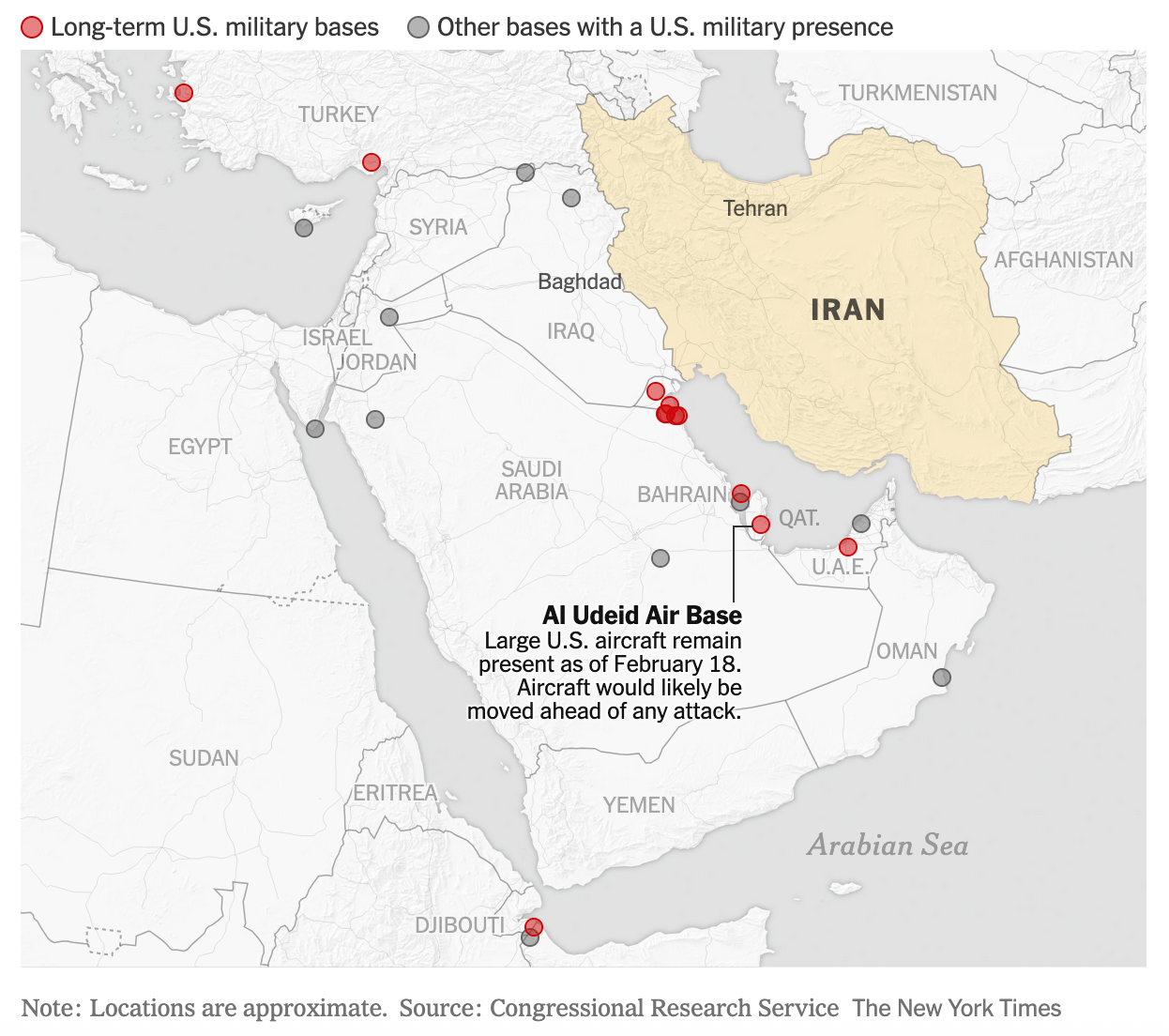Is America about to go to war (again) with Iran?
Critical Analysis
Find answers to the following questions using the visual above, any links below, your big brain, and your knowledge of American government and politics:
According to the visual above, how many ships does the U.S. have in the vicinity of Iran?
According to the visual above, how many bases hosting aircraft does the U.S. have in the vicinity of Iran?
A second U.S. aircraft carrier is now approaching the middle east. On June 22, 2025, the United States military attacked three nuclear facilities in Iran under the code name Operation Midnight Hammer. Although those facilities were damaged, repair work has been completed. Based on the visual above and below, it looks like the U.S. is mobilizing to strike Iran again. Do you think we should go to war with Iran?
In late 2025 and early 2026 an estimated 30,000 people were killed during the violent crackdown by security forces on protests in Iran. At the time, President Trump promised Iranians that help was "on its way" and that Iranian authorities would "pay a big price" for the killings, and urged people to "keep protesting". Thousands of these protestors died. Do you think that military buildup in the Middle East is the “help” the president promised?
Based on the visual below*, most Americans appear to not know where Iran is. Do you think you could locate Iran on a map?
Does American’s general lack of knowledge of world geography and politics make it more or less likely that we will go to war?
As of early 2026, a significant majority of Americans oppose direct military action against Iran, with polling indicating widespread reluctance to engage in another Middle Eastern war. Today, roughly 49% to 85% of Americans oppose direct military intervention, including strikes or full-scale war. Additionally, most of our allies in the Middle East have asked the U,S. not to intervene in Iran. As of early 2026, the opinion of key U.S. allies on direct military intervention in Iran is largely characterized by strong opposition to a full-scale war, driven by fears of regional destabilization and retaliation. In general, describe how much President Trump considers public opinion and the opinion of our allies when making foreign policy.
The Constitution divides war power in the following way. Congress (Article I, Section 8): Has the sole authority to "declare War," "raise and support Armies," "provide and maintain a Navy," and issue "Letters of Marque and Reprisal". Congress also regulates the militia and makes rules for the government and regulation of land and naval forces. President (Article II, Section 2): Serves as "Commander in Chief of the Army and Navy of the United States," allowing them to direct the military once authorized. Why did the Framer’s divide this power?
Civilian control of the U.S. military is a central American value. Identify one way is the U.S. military controlled by civilians.
On the campaign trail and in his first Inaugural Address, Donald Trump declared his commitment to what he called an “America First” approach to foreign policy. The slogan itself had been especially prominent in the 1930s, when right-wing political activists sympathetic to Nazi Germany and fascism rallied against American intervention in World War II. More generally, Trump’s foreign policy reflected an isolationist strand that had largely been marginalized in national affairs since World War II. Foreign policy in the second Trump administration has been much more interventionist, with an invasion of Venezuela, bombing of Iran, and strikes in Nigeria, and Somalia. Why do you think the Trump administration has changed its foreign policy stance?
Write and Discuss
Take ten minutes to write about the question at the top of the page and then discuss with your classmates.
Act on your Learning
Contact the White House and let them know what you think about fighting Iran.
Get Creative
Create a bumper sticker that is pro-Iran war or one that is anti-Iran war. Share your design with your classmates.
Learn More*
This lesson is here today but it will be gone tomorrow…unless you subscribe to our AP Government Archive.
Over 1000 amazing AP Government bell ringers tagged and searchable by topic; plus activities, games, reviews, and more. Cancel at any time. Use promo code SIGNMEUP at checkout to get the first month of our monthly subscription for free!




